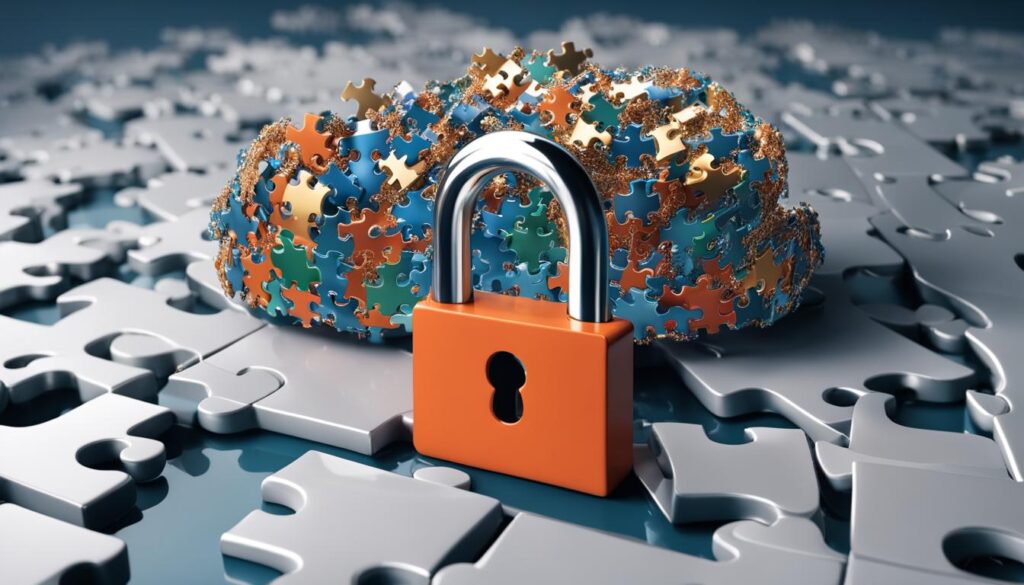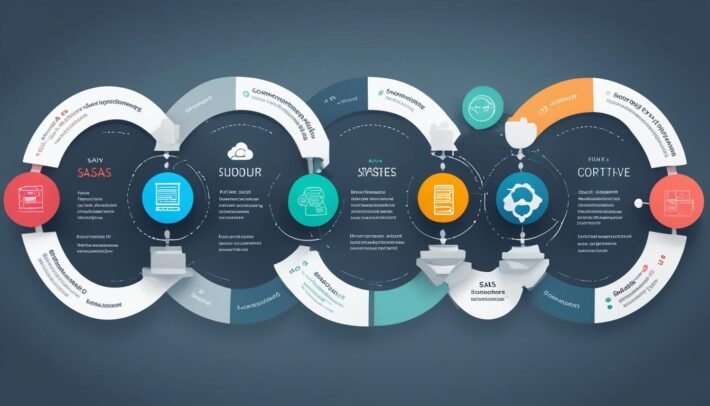Navigating Legal Considerations in the SAAS Industry

In the fast-paced world of Software as a Service (SAAS), legal considerations are a critical aspect of doing business. As SAAS companies continue to innovate and grow, it’s essential to have a solid understanding of the legal and regulatory requirements that apply to the industry. Failure to comply with these requirements can result in severe consequences, including legal and financial liabilities, loss of reputation, and damage to your business.
This article will provide a comprehensive overview of the legal considerations that SAAS businesses should be aware of. We will cover crucial topics such as data privacy, intellectual property, compliance with industry-specific regulations, risk management, and ensuring robust contracts with vendors, suppliers, employees, and contractors.
Key Takeaways:
- Legal compliance is crucial for SAAS companies to ensure business success and avoid liabilities.
- SAAS companies need to be aware of industry-specific regulations and compliance requirements.
- Data privacy, intellectual property, and risk management are essential legal considerations in the SAAS industry.
- Creating robust contracts with vendors, suppliers, employees, and contractors can protect your business interests.
- Ongoing monitoring of regulatory updates is necessary for SAAS companies to maintain compliance.
Key Legal Considerations for SAAS Businesses
SAAS businesses operate in a complex legal landscape that requires careful navigating to avoid costly legal disputes and regulatory violations. It is crucial to have an in-depth understanding of the key legal considerations that can impact SAAS businesses.
Data Privacy
Data privacy is a significant concern for SAAS businesses and their users. SAAS businesses must comply with local and international data protection regulations and implement robust data security measures to protect sensitive user data from breaches and unauthorized access. It’s essential to have clear and comprehensive data privacy policies that inform users about data collection, use, and disclosure practices.
Intellectual Property
Intellectual property is a significant asset for SAAS businesses, including technology, copyrights, trademarks, and trade secrets. It is crucial to protect these assets through legal means and prevent infringement by competitors. SAAS businesses must conduct thorough intellectual property searches to avoid violating intellectual property rights of others and establish clear policies on intellectual property rights ownership.
Liability
SAAS businesses are exposed to various types of liability, including contractual, tort, and regulatory liability. It’s crucial to identify and mitigate potential liability risks, including data breaches, service interruptions, and product liability issues, through appropriate risk management strategies and a comprehensive indemnification clause.
Industry-Specific Regulations
SAAS businesses operate in different industries, each with its own set of legal and regulatory requirements. It’s important to understand and comply with these industry-specific regulations to avoid costly fines and penalties. SAAS businesses must also implement industry-specific compliance measures to meet these regulatory requirements.
Understanding SAAS Contracts
SAAS contracts are the backbone of any SAAS business, and understanding their key components is essential for protecting your interests. The following clauses should be included in a standard SAAS contract:
- Data Ownership: Clearly define the ownership of user data and ensure that the SAAS provider cannot claim any rights to the data.
- Termination: Establish the conditions under which either party can terminate the agreement, including notice periods and obligations upon termination.
- Service Level Agreements (SLAs): Outline the levels of service that the SAAS provider will deliver, such as uptime and responsiveness.
- Security: Ensure that the SAAS provider has adequate security measures in place to protect user data from breaches.
- Intellectual Property: Establish ownership and rights to use any intellectual property involved in the SAAS offering.
SAAS contracts should also be drafted with language that is clear and easily understood by both parties, without any ambiguous or misleading terms. A SAAS contract specialist should be consulted to ensure that all essential components are included and that proper legal language is used.
Ensuring Compliance in the SAAS Industry
Compliance is a critical aspect of the SAAS industry. To gain and maintain the trust of customers and meet legal requirements, SAAS businesses must adhere to various compliance considerations.
Data Protection Laws
SAAS businesses are responsible for ensuring the protection of user data. Compliance with data protection laws like the GDPR and CCPA is essential. Businesses must have a clear understanding of these regulations and implement necessary data protection measures to maintain compliance.
Cybersecurity Regulations
Cybersecurity threats are a major concern for SAAS businesses, and compliance with cybersecurity regulations is crucial. Businesses must implement strong security measures to prevent unauthorized access, theft, and loss of data.
International Data Transfers
Transferring data internationally comes with unique legal considerations. Compliance with international laws and regulations is necessary for SAAS businesses to avoid legal disputes. Businesses must ensure they have the right agreements, documentation, and consent to transfer data across borders.

Trust and Transparency
Adhering to legal requirements goes hand-in-hand with building trust in the SAAS industry. Customers trust businesses that prioritize data protection and demonstrate compliance. A transparent approach to compliance can also differentiate businesses from their competitors.
Ensuring Compliance as a Continuous Process
Staying compliant requires an ongoing effort from SAAS businesses. Regularly reviewing and updating compliance policies, procedures, and practices is crucial. Compliance should also be considered at every stage of a business’s growth and development.
Overall, compliance is an essential aspect of the SAAS industry that cannot be overlooked. By prioritizing compliance and taking necessary measures to adhere to legal requirements, businesses can establish a foundation of trust and build long-term success.
Data Privacy and Security in SAAS
Data privacy and security are paramount concerns for SAAS businesses. Customer data is often the lifeblood of these businesses, and protecting it is vital to maintaining trust and preventing legal liabilities. The following best practices can help ensure the security of user data:
- Implement strong security measures like multi-factor authentication, encryption, and regular security audits
- Obtain necessary consents and permissions before collecting and processing customer data
- Adhere to data protection regulations like the GDPR and CCPA
- Regularly train employees on data protection policies and procedures
By taking these steps, SAAS businesses can protect customer data and minimize the risk of data breaches and other security incidents.
In recent years, high-profile data breaches have underscored the importance of data privacy and security in the SAAS industry.
One such example is the 2019 breach of Capital One, in which a hacker gained access to more than 100 million customer records stored in the company’s AWS cloud servers. The hacker exploited a misconfiguration in the firewall to access sensitive data, including names, addresses, credit scores, and Social Security numbers. The breach resulted in significant legal and financial repercussions for Capital One.
In addition to the legal and financial risks, data breaches can also damage a SAAS business’s reputation and customer trust.
To illustrate the importance of adhering to data protection regulations, let’s take a closer look at the GDPR. The GDPR is a legal framework that sets guidelines for the collection and processing of personal information of individuals within the European Union (EU). Even if a SAAS business is not based in the EU, it must comply with the GDPR to offer its services to EU customers. Failure to comply with the GDPR can result in hefty fines, as well as loss of business from customers who prioritize data privacy.
Intellectual Property Rights in SAAS
Protecting intellectual property rights is a critical element for the success of any SAAS business. Intellectual property rights can include software, proprietary technology, trademarks, copyrights, and trade secrets. Failure to protect those rights can lead to significant financial losses, reputation damage, and even legal troubles.
SAAS businesses should take proactive measures to safeguard their intellectual property rights. One way to do that is by using non-disclosure agreements (NDAs) with employees, contractors, and other parties to prevent the unauthorized use or disclosure of proprietary information.
Another essential strategy is to register trademarks and copyrights to ensure that the business has exclusive rights to use its designs, logos, and other creative works. Clear ownership clauses should also be included in SAAS contracts to explicitly establish ownership rights and limit the use of proprietary technology by customers or third parties.
Creating a comprehensive intellectual property policy and periodically reviewing and updating it is also critical. This involves identifying and monitoring intellectual property assets, maintaining accurate records, and ensuring that the business is compliant with relevant laws and regulations as they evolve over time.

A SAAS business that fully protects its intellectual property rights is more likely to succeed in today’s competitive market. Therefore, SAAS businesses should always prioritize the protection of their intellectual property rights as an essential element of their overall business strategy.
User Agreement and Terms of Service
Creating a comprehensive user agreement and terms of service is crucial for every SAAS business. These agreements outline the terms and conditions that govern the relationship between the company and its users, establishing guidelines for acceptable use and minimizing legal risks.
The user agreement should include:
- Clear definitions of key terms and concepts
- User rights and responsibilities
- Limits on liability and disclaimers
- Provisions for termination and account suspension
- Rules for acceptable use and code of conduct
- Intellectual property ownership and use
- Dispute resolution mechanisms
Terms of service should cover:
- Payment terms and billing information
- Suspension and cancellation policies
- Warranties and guarantees
- Service level agreements
- Privacy policies and data usage
- Updates and changes to the terms of service
The agreements should be clear, concise, and written in plain language that the average user can understand. It’s also important to ensure that users have an opportunity to review and accept the terms before using the service.
Ensuring that the agreements are enforceable is critical. Companies should consult with legal counsel to ensure that the agreements comply with relevant laws and regulations. The agreements should be regularly reviewed and updated as necessary to reflect changes in the business or legal landscape.
Compliance with Industry-Specific Regulations
Certain SAAS businesses must comply with industry-specific regulations to operate legally. Failure to follow these regulations can result in hefty fines and damage to the company’s reputation. Some examples of sector-specific regulations that SAAS businesses must adhere to are:
| Regulation | Description |
|---|---|
| Healthcare Privacy Laws (HIPAA) | Applies to SAAS businesses that handle medical data and requires compliance with strict safeguards for patient information. |
| Financial Industry Compliance (PCI DSS) | Requires SAAS businesses that handle financial data to protect it according to stringent security standards. |
| Telecommunications Regulations | SAAS businesses that provide telecom services must adhere to legal requirements set by the industry regulators. |

Meeting these regulations can be complex and time-consuming for SAAS businesses. It’s essential to stay up-to-date with the latest changes to these regulations, maintain accurate records, and implement robust compliance programs. By doing so, SAAS businesses can ensure legal compliance, gain customer trust, and avoid legal complications down the road.
International Operations and Legal Considerations
Expanding operations globally can be a great growth opportunity for SAAS businesses, but it comes with unique legal considerations.
Cross-Border Data Transfers: When operating internationally, SAAS businesses need to ensure that they comply with local data protection laws. Data transfers between countries can be subject to restrictions and require safeguards to protect personal information. The GDPR, for example, prohibits the transfer of personal data outside of the EU unless specific conditions are met.
Jurisdictional Differences: Laws and regulations vary across countries, which can create challenges for SAAS businesses. It’s important to seek legal advice to ensure compliance with local laws, particularly regarding data privacy, intellectual property, and contracts.
Compliance with International Laws and Regulations: SAAS businesses operating globally must adhere to international laws and regulations, such as the Foreign Corrupt Practices Act (FCPA) and the UK Bribery Act. Violations can result in hefty fines and reputational damage.
To ensure compliance with international laws and regulations, SAAS businesses should conduct thorough due diligence on any new markets they plan to enter. This can involve researching local laws and obtaining legal advice from experts in the relevant country or region.
Key Considerations for SAAS Businesses Expanding Internationally
| Consideration | Description |
|---|---|
| Data Privacy | Compliance with local data protection laws, including restrictions on cross-border data transfers. |
| Jurisdictional Differences | Awareness of local laws and regulations, particularly regarding data privacy, intellectual property, and contracts. |
| Compliance with International Laws | Adherence to international laws and regulations, such as the FCPA and UK Bribery Act. |
| Due Diligence | Conducting thorough research and seeking legal advice from experts in the relevant country or region. |
Vendor and Supplier Contracts
SAAS businesses often rely on third-party vendors and suppliers, which necessitate legally binding contracts that establish vendor obligations and protect the business’s insurable interests. From contract negotiation to execution, it’s critical to handle vendor and supplier contracts with care and precision to avoid damaging legal disputes in the future.
Contract Negotiation
When dealing with vendor contracts, negotiation is critical as it plays a huge role in achieving a fair and beneficial agreement for both parties. Vendors usually submit standard contracts, but SAAS businesses should negotiate terms that are advantageous, secure, and compliant. Negotiators should agree on key terms such as payment, deliverables, quality of work, and the contract duration.
Intellectual Property Rights
SAAS businesses must look after their intellectual property, such as proprietary software or vendor-created data. They should establish clear terms in supplier contracts that define who owns or maintains vendors’ creations. Additionally, supplier contracts should clarify whether the business has the right to audit vendors for compliance with legal requirements or the service level agreement.
Service Level Agreements and Confidentiality
Service level agreements (SLAs) set vendor service expectations, so businesses should make sure that they outline vendor deliverables and what happens when vendors fail to meet expectations. Confidentiality agreements are also important, as vendors often manage data, IP, or business secrets. SLAs and confidentiality agreements ensure that vendor commitments are cascaded and anchored into a mutual understanding of the contract.
Risk Management and Insurance for SAAS Businesses
SAAS businesses face various risks, ranging from service interruptions to legal disputes. It’s crucial to have an effective risk management strategy in place to minimize potential liabilities and ensure continuity of operations.
One essential aspect of risk management is adequate insurance coverage. The right insurance policy can provide financial protection from unexpected events that could otherwise cripple a business. Depending on the type of SAAS business, insurance coverage may include:
| Insurance Type | Description |
|---|---|
| General Liability Insurance | Covers damages or injuries caused by the business or its employees to third parties. |
| Data Breach Insurance | Protects against the financial losses resulting from a data breach, including recovery costs and identity theft protection for affected customers. |
| Professional Liability Insurance | Covers the costs of legal defense and damages awarded in the event of a lawsuit claiming professional negligence or improper advice. |
| Business Interruption Insurance | Provides financial compensation for lost income and additional expenses incurred as a result of an unexpected interruption in business operations, such as a natural disaster or cyber-attack. |
It’s essential to assess the specific risks faced by a SAAS business and seek insurance coverage that provides adequate protection. Working with an insurance broker who understands the SAAS industry can help identify the appropriate coverage options.
Moreover, risk management is an ongoing process, and it’s vital to regularly review and update insurance policies to ensure they align with the current business needs and risks. It’s also recommended to have legal counsel review insurance policies to ensure they provide sufficient coverage and do not contain any unfavorable clauses.
Resolving Legal Disputes in the SAAS Industry
Despite proactive measures, legal disputes may arise in the SAAS industry, causing significant disruptions and financial losses for businesses. To minimize these risks, SAAS companies need to be prepared with effective dispute resolution mechanisms. There are several methods for resolving legal disputes, including:
- Negotiation: This is a voluntary and informal process where parties attempt to reach an agreement without involving a third party. Businesses can attempt to resolve disputes through negotiation, which can be quicker and less expensive than other methods.
- Mediation: In this process, an impartial third party, or mediator, helps the parties negotiate a resolution to the dispute. This method can be less formal and less expensive than arbitration or litigation and may promote a more amicable relationship between parties afterward.
- Arbitration: In this process, an impartial third party, or arbitrator, hears evidence and makes a decision that is binding on the parties. This method is often quicker and less expensive than litigation but is still more formal and expensive than negotiation or mediation.
- Litigation: This is a formal legal process where parties present evidence and arguments to a judge or jury who make a decision that is legally binding. This method is often the most expensive and time-consuming but may be necessary if other methods do not resolve the dispute.
It’s important for businesses to understand their options and choose the most appropriate method for their specific dispute and circumstances. A company’s legal counsel may be invaluable in helping to determine the best route to take.
Remember, the best way to avoid legal disputes is to proactively manage risks and maintain compliance with legal regulations. Should a dispute arise, having effective resolution mechanisms in place can help minimize disruptions and protect the longevity of SAAS businesses.
Employee and Contractor Agreements
SAAS businesses must establish clear agreements with their employees and contractors to protect their interests and intellectual property. These agreements are crucial to define the scope of work, obligations, and responsibilities of each party involved, ensuring legal compliance, and avoiding potential disputes.
Employee agreements should clearly outline job descriptions, payment terms, benefits, and termination clauses. It’s vital to include non-disclosure provisions to protect proprietary information and trade secrets. Additionally, non-compete clauses can prevent employees from going to work for or start a competitor business.
Contractor agreements are similar to employee agreements but usually have more flexible terms and conditions. These agreements should specify the scope of services, payment structure, and ownership of intellectual property. It’s essential to include indemnification clauses that protect the business against any liabilities incurred by the contractor.
Note: Contracts should be drafted by legal professionals to ensure their enforceability and compliance with relevant laws and regulations.
Regulatory Updates and Ongoing Compliance
The legal landscape for SAAS businesses is always changing. Keeping up with regulatory updates is critical to avoid costly penalties and reputational harm. Ongoing compliance is equally important to ensure that your business meets legal requirements and builds trust with customers.
The following are some best practices for staying up-to-date with regulatory updates:
- Subscribe to industry publications: Industry publications such as SaaS Magazine or SoftwareExecutive provide insights and updates regarding legal regulations and industry trends.
- Monitor regulatory agencies: Government regulatory agencies such as the Federal Trade Commission (FTC) or the European Union’s General Data Protection Regulation (GDPR) release updates and guidance for SAAS businesses.
- Engage legal counsel: Working with legal counsel specializing in SAAS businesses can provide guidance and insight regarding regulatory updates and compliance.
- Regularly review and update policies: SAAS businesses must maintain current policies and procedures related to data privacy, information security, and other legal requirements.
Implementing ongoing compliance practices can help your business maintain legal and regulatory compliance. Here are some strategies to consider:
- Perform regular risk assessments: Regular risk assessments can help identify potential areas of non-compliance and mitigate risks.
- Training and education: Provide periodic training to employees and executives on legal requirements, data security, and compliance policies.
- Conduct internal audits: Regularly review internal practices and procedures to ensure compliance with legal requirements.
- Establish a compliance program: Implement a formal compliance program that includes written policies and procedures, regular training, and an audit process.
Drafting Robust SAAS Contracts
Creating a strong SAAS contract is vital for safeguarding business interests and minimizing legal risks. Consider the following tips when drafting a robust SAAS contract:
- Clear Definitions: Clearly define all key terms to avoid any ambiguity or misunderstandings.
- Scope of Services: Outline the scope and limitations of the services offered to ensure agreement on the nature and extent of the service.
- Pricing: Define pricing structures, including any payment terms, to create transparency and minimize disputes.
- Limitations of Liability: Limit liability for potential damages or losses through indemnification clauses and clear statements of warranties and limitations of liability.
- Warranties: Include provisions for performance and service-level warranties to establish quality standards and guarantee the quality of services provided.
- Indemnification Clauses: Indemnification clauses are important to limit legal risk and define responsibility for any legal or financial consequences resulting from the use of the SAAS product.
- Service Level Agreements: Establish clear service level agreements covering uptime, response time, and other performance metrics to manage expectations and provide quality service.
It’s essential to review the contract carefully and seek professional legal advice when drafting SAAS contracts to ensure regulatory compliance and minimize legal risks.
Conclusion
Legal compliance is crucial for the success and longevity of SAAS businesses. In this article, we explored the essential legal considerations for SAAS businesses, including data privacy, intellectual property, compliance, and contractual agreements.
By prioritizing legal compliance and risk management, SAAS businesses can establish trust with their users, protect their valuable assets, and minimize potential liabilities.
Keeping up with industry-specific regulations, the evolving legal landscape, and implementing ongoing compliance practices are essential to stay ahead of potential legal issues.
Drafting robust SAAS contracts that reflect the unique needs of your business is also crucial for legal compliance and protecting your interests.
By implementing best practices and staying informed about legal updates, SAAS businesses can stay ahead of legal issues and focus on providing their customers with innovative and valuable services.
Remember, legal compliance is not an option, but a requirement for the SAAS industry. Don’t risk your business’s success – prioritize legal compliance today.
FAQ
What are the key legal considerations for SAAS businesses?
SAAS businesses need to be aware of various legal considerations, including data privacy, intellectual property, liability, and compliance with industry-specific regulations.
What should be included in SAAS contracts?
SAAS contracts should include important clauses such as data ownership, termination, and service level agreements to protect the interests of the business.
How can SAAS businesses ensure compliance?
SAAS businesses must address compliance with data protection laws, cybersecurity regulations, and international data transfers to maintain trust and meet legal requirements.
What are the best practices for data privacy and security in SAAS?
Implementing strong security measures, obtaining necessary consents, and adhering to data protection regulations like GDPR and CCPA are some of the best practices for SAAS businesses to protect user data.
Why is intellectual property rights important for SAAS businesses?
Protecting intellectual property rights, including proprietary technology, trademarks, copyrights, and trade secrets, is crucial for SAAS businesses to preserve their valuable assets.
What should be included in user agreements and terms of service?
User agreements and terms of service should outline user rights, responsibilities, limitations of liability, and dispute resolution mechanisms to establish clear and enforceable agreements.
How can SAAS businesses comply with industry-specific regulations?
SAAS businesses operating in specific industries should ensure compliance with sector-specific regulations such as healthcare privacy laws (HIPAA), financial industry compliance (PCI DSS), and telecommunications regulations.
What are the legal considerations for SAAS businesses operating internationally?
SAAS businesses expanding globally must address issues like cross-border data transfers, jurisdictional differences, and compliance with international laws and regulations.
What legal aspects should SAAS businesses consider when working with vendors and suppliers?
SAAS businesses should pay attention to contract negotiation, intellectual property rights, confidentiality, and service level agreements when working with vendors and suppliers.
How can SAAS businesses manage risks and obtain adequate insurance coverage?
Implementing risk management strategies and obtaining appropriate insurance coverage can help SAAS businesses mitigate potential liabilities from data breaches, service interruptions, and legal disputes.
What are the dispute resolution mechanisms for SAAS businesses?
SAAS businesses can resolve legal disputes through negotiation, mediation, arbitration, or litigation, depending on the nature and complexity of the issue.
What should SAAS businesses include in employee and contractor agreements?
Employee and contractor agreements should include obligations, non-disclosure provisions, and non-compete clauses to protect the interests and intellectual property of SAAS businesses.
How can SAAS businesses stay compliant with evolving regulations?
Staying informed about regulatory updates and implementing ongoing compliance practices are essential for SAAS businesses to adapt to changing legal requirements.
What should be considered when drafting SAAS contracts?
When drafting SAAS contracts, it is important to include clear definitions, scope of services, pricing, limitations of liability, warranties, and indemnification clauses to ensure a robust agreement.



